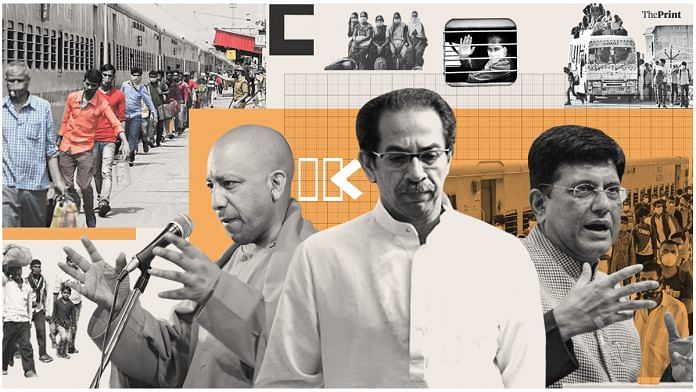Maharashtra CM Uddhav Thackeray’s accusation that the Railways is not running enough trains to ferry migrant workers sparked a Twitter war with Railway minister Piyush Goyal who sought passenger details from the state. UP CM Yogi Adityanath also said that any state that wishes to hire workers from his state will need to seek his permission.
ThePrint asks: Yogi vs Uddhav vs Piyush Goyal: Will politics over migrant workers hurt economic revival?
Opposition’s blame-game will not affect UP’s economic revival under Yogi Adityanath
 Chandra Mohan
Chandra Mohan
BJP UP spokesperson
The opposition in India is busy playing politics. But a state as large as Uttar Pradesh, Chief Minister Yogi Adityanath has been taking policy decisions keeping in mind human compassion and welfare, even for the smallest of business owners like street vendors. The recovery rate of Covid-19 patients in Uttar Pradesh has also increased. The state government has prepared a list of migrant workers on the basis of skill-mapping. Next, it will provide employment and job security to more than 24 lakh workers who will be returning to the state.
I condemn the political blame-game started by the opposition, but I do not see it affecting the revival of economic activity in Uttar Pradesh. CM Adityanath is moving forward with his plans with good momentum.
About 1,174 Shramik trains have reached UP carrying over 15 lakh workers. There are 102 more trains that are expected to reach in the next two-three days. The state government has been coordinating with Indian Railways to achieve this and also ensure that there is no spread of coronavirus during travel.
Yogi Adityanath’s politically-charged statements are bound to impair economic revival
 Manisha Kayande
Manisha Kayande
Shiv Sena leader and member, Maharashtra Legislative Council
Uttar Pradesh chief minister Yogi Adityanath’s statements are unconstitutional, unwarranted and lack locus standi. Citizens of India have a fundamental right to work and travel anywhere within the country, and they do not require a state’s permission. Politically-charged statements like this are bound to impair economic revival for migrant workers who are already facing job losses and dried up savings.
The unprecedented lockdown has left more than 10 lakh migrant workers in Maharashtra stranded. In April, Maharashtra CM Uddhav Thackeray had requested the Centre to relax the lockdown so that they could go home. Back then, the spread of infection wasn’t as extensive as it is now in the state. But only later, when the spread of infection became worse did the Centre wake up.
With regard to railway minister Piyush Goyal’s comments, I think that a lot of it was unwarranted. Why should the railway minster directly talk to the CM of a state, in this case Uddhav Thackeray, that too on a public platform like Twitter? The concerned railway officials could have discussed the issue among themselves and devised the next policy step. Let’s also remember that organising the Shramik trains does not warrant praise for the Indian Railways – it is their job. Meanwhile, the Maharashtra government has spent almost Rs 58 crore and arranged trains for 7.38 lakhs migrants workers.
Yogi vs Uddhhav vs Goyal over migrant workers reflects states suffering grave economic damage
 Ajay Bodke
Ajay Bodke
CEO & chief portfolio manager (PMS) at Prabhudas Lilladher Pvt Ltd
The migrant worker crisis is both a human and economic tragedy. Politics over the migrant crisis is in fact a reflection of how all states in India are suffering grave economic damage.
Home states of migrant workers like UP, Bihar, Odisha, Bengal etc are mainly agrarian and will now have to ramp-up spends on healthcare to check any likely spike in Covid-19 related cases due to the influx of migrant workers. Meanwhile, industrialised states in the West, North and South of India that are losing migrant workers by the millions are staring at acute shortage of skilled labour that is essential for reviving their stalled economies. Many organised retailers, transporters, logistics providers etc have been compelled to offer extra pay to their staff to keep the operations going during the lockdown. Other costs to maintain social distancing norms in factories and shops will also increase, burdening the industries at a time of dwindling sales and putting pressure on profitability. The key will now be in incentivising the labour available in these states to come and work.
Now, a painful Cornelian dilemma haunts the hapless migrant workers – stay back home and give-up on a remunerative livelihood, which will impact their families, or return to the big cities where Covid cases continue to rise and fears of contracting the dreaded disease are rampant.
Govts had data on inter-state migration, but didn’t plan anything for workers. They’re busy mud-slinging
 Santosh Mehrotra
Santosh Mehrotra
Professor of Economics and Chairperson, Centre for Informal Sector and Labour Studies, JNU
Shramik trains started running on 1 May, full 37 days after the lockdown began. What should have started on Day 1 — with a determined effort to test those travelling back, quarantining those testing Covid-19 positive at the station, and allowing others to travel by train (their records could have been shared with their gram panchayats for continued monitoring) — was never done. India has witnessed the most callous treatment of its workers.
Meanwhile, fed up of waiting, the jobless workers began walking back — dying in the heat, run over by trucks and train, hungry, exhausted. As of 24 May, 667 migrants had died on the way. Unconcerned, political parties and governments are still engaged in a mud-slinging match, over 60 days since lockdown began.
We saw how Karnataka CM B.S. Yeddiyurappa had succumbed to the builder lobby to cancel Shramik trains (though he later backtracked). The Working Group on Migration (2017) identified 54 districts with high interstate out-migration intensity, accounting for half the male interstate out-migration in India. Of these, 36 districts are in eastern Uttar Pradesh and Bihar. When this information (and more) is public, why was arranging trains so difficult, and delayed? What prevents governments from calling up experts to guide them?
Maharashtra, Delhi first tried to get rid of migrant workers. Now they face shortage of workforce
 AK Verma
AK Verma
Director, Centre for the Study of Society and Politics (CSSP), Kanpur
The exodus of migrant workers from Maharashtra, Delhi, Gujarat etc to their domicile states have put tremendous financial strain on UP, Bihar, Madhya Pradesh, West Bengal, Jharkhand etc. Maharashtra and Delhi reportedly manipulated to get rid of these workers from other states. Some workers travelled hundreds of miles on foot with their parents, wives and children to reach home. Now these states realise foolishness of their action when they face acute shortage of workers to kick-start their reeling economies.
UP CM Yogi Adityanath plans to convert this into an opportunity. He has rehabilitation plans for migrant workers through the Migrant Workers Commission to the discomfiture of Maharashtra CM Uddhav Thackeray. This will rehabilitate workers and use them as catalysts to boost the state economy. Rightly, he may not let them go back. It may also reverse urban migration and make our villages epicentre of development and prosperity.
Significant political discourse in India may shift to ‘subalterns’ propelling caste politics to class politics. However, this may inject some negativity in horizontal federalism, between states, especially where different parties are in power as we saw in the war of words between Yogi and Uddhav or in the tweet-war between railway minister Piyush Goyal and the Maharashtra CM.
Also read: Discrepancy in Delhi Covid data: Is Arvind Kejriwal govt being transparent enough?
By Pia Krishnankutty, journalist at ThePrint




As the African proverb says, when elephants fight, it is the grass that suffer.
No one should believe the fairy tale that Uttar Pradesh will be able to create jobs for migrants who return from more developed states. The workers will, in due course, return to their host states. However, they have been through a traumatic time, justly feel they have been hard done by. Arranging safe transport home for them, through a combination of rail and state transport buses, was possible, ought to have been done in late March itself. 2. My greater worry is that the economic recovery will be slow, sluggish, not all the jobs that have evaporated will come back. All these people back in their villages, some carrying the virus, other poor households as well will need to be supported with monetary transfers and PDS supplies. For that matter, urban households as well. The Centre and the states have to share the financial burden. The only sacrosanct principle at such a desperate time is : People do not starve to death in a democracy.